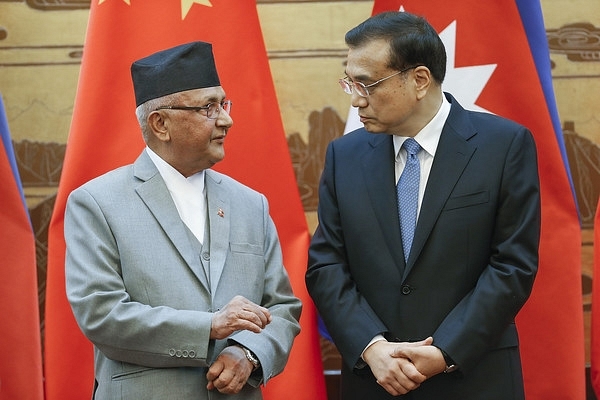
Nepal Wanted To ‘Balance’ India By Cosying Up To China. It Got A Big Headache Instead
There is growing resentment in Nepal against Chinese criminal gangs involved in human trafficking, financial frauds and predatory and immoral activities.
Chinese criminals — mainly human traffickers and fraudsters — operating in Nepal has emerged as one of Kathmandu’s biggest headaches of late.
There have been a string of arrests of Chinese nationals for various crimes in Nepal, and their crimes have riled citizens of the Himalayan nation.
The latest such was the arrest of 122 Chinese nationals from Kathmandu in the last week of December for banking frauds and illegal financial transactions.
The items that police recovered from them — 747 mobile phones, 331 laptops, 18 CPUs, 19 monitors, 22 pen drives and 327 SIM cards — pointed to their involvement in banking frauds.
The Interpol had tipped off the Nepal Police about the activities of the Chinese nationals. Most had entered Nepal illegally since valid passports could be recovered from only 67 of them.
According to this report in The Kathmandu Post, more than 800 Chinese nationals living in Nepal are under watch. The police there also suspect that many Chinese nationals who are in the country on tourist visas are engaged in illegal business activities.
Even as investigating agencies in Nepal were probing the activities of the 122 arrested Chinese nationals, Beijing leaned hard on Kathmandu to allow their deportation to China. The Kathmandu Post reports that the Chinese embassy in Kathmandu issued travel documents to all the 122 on Monday.
“They were fined only one thousand rupees (about Indian rupees 625) for ‘indecent behaviour’. Nepal has allowed them to go virtually scot free even though they have broken our country’s laws. This is outrageous,” said a Member of Parliament of the ruling Nepal Communist Party (NCP) who does not approve of his party leadership’s subservience to China.
The lawmaker’s outrage is shared by many in Nepal who resent China’s growing footprints, and Chinese nationals’ overbearing attitude.
“Chinese nationals who come to Nepal act like bullies. They are engaged in various types of unlawful activities,” said Ramesh Poudel of Nepal Rashtrawadi Sanchetna Sabha (Nepal Nationalist Awareness Forum).
On 1 September last year, five Chinese nationals were arrested by Kathmandu Metropolitan Police for their involvement in a string of ATM frauds. More than Nepali rupee 12.6 million (INR 78.7 lakh), $10,000, 132 forged debit cards, card cloning devices and other electronic equipment were recovered from them.
The Chinese nationals had successfully hacked the Nepal Electronic Payment System (NEPS), an interface that allows the transaction of money deposited in a bank by using cards issued by other member banks.
The Chinese criminals had fraudulently withdrawn Nepali rupees 34.5 million (INR 2.15 crore) from Nepal’s banks and INR 1.05 crore from Indian bank ATMs in Nepal (using Nepal’s leaky NEPS).
Despite their crimes, the five Chinese nationals were allowed to go away to their country by Kathmandu under pressure from Beijing. Under the ‘Treaty on Mutual Legal Assistance in Criminal Matters’ signed during President Xi Jinping’s visit to Kathmandu in October last year, nationals of one country who break the laws of another country will be tried under the laws of that country.
In late-August last year, four Chinese nationals were arrested from Kathmandu airport for trafficking in women. According to this report in The Kathmandu Post, Nepali girls are being trafficked in large numbers to China to be sold as ‘brides’ (a euphemism for sex slave).
China has a skewed sex ratio (thanks to its earlier ‘one child’ policy) where men far outnumber women).
“A huge number of single Chinese men come to Nepal for having sex with women here. Many of them keep Nepali girls as their concubines, or even lure them away to China,” said a spokesperson of Nepal’s Alliance Against Trafficking of Women and Children.
Such predatory and immoral activities by visiting Chinese nationals have also evoked strong resentment in Nepal against them (read this). A number of demonstrations have been held in front of the Chinese mission in Kathmandu in recent times by rights groups.
In August-September last year, huge demonstrations were held in front of Chinese telecom major Huawei’s office in Kathmandu to protest alleged hacking of 200 Nepali websites, including some Nepal government ones.
Nepal Telecom Minister Gokul Baskota has had to face many demonstrations, and is under probe now, for allegedly awarding 4G network contract to Huawei without calling for tenders.
“Chinese businessmen and even tourists break Nepal’s laws, throw their weight around and mistreat Nepalis. Being forced to put up with such behaviour of Chinese is an insult to our national pride and sentiments,” said Nepal Rashtrawadi Sanchetna Sabha’s Ramesh Poudel.
Kathmandu’s subservience to Beijing, all thanks to Nepal Prime Minister K P Sharma Oli’s blind love for China, has now started ruffling feathers in the Himalayan country.